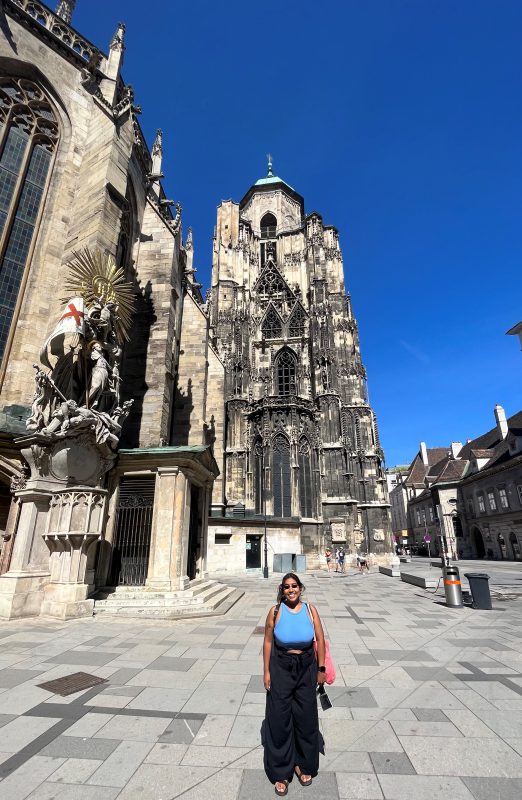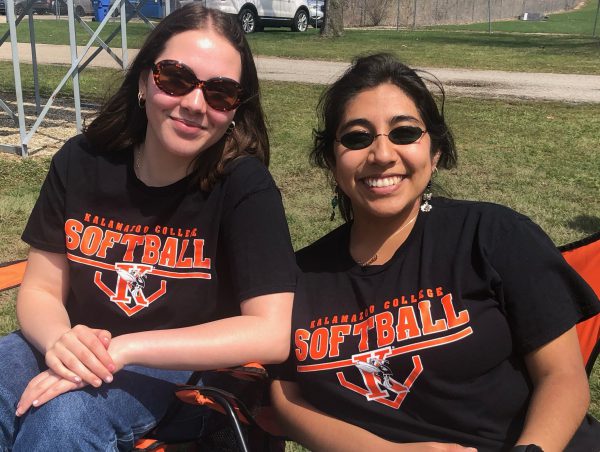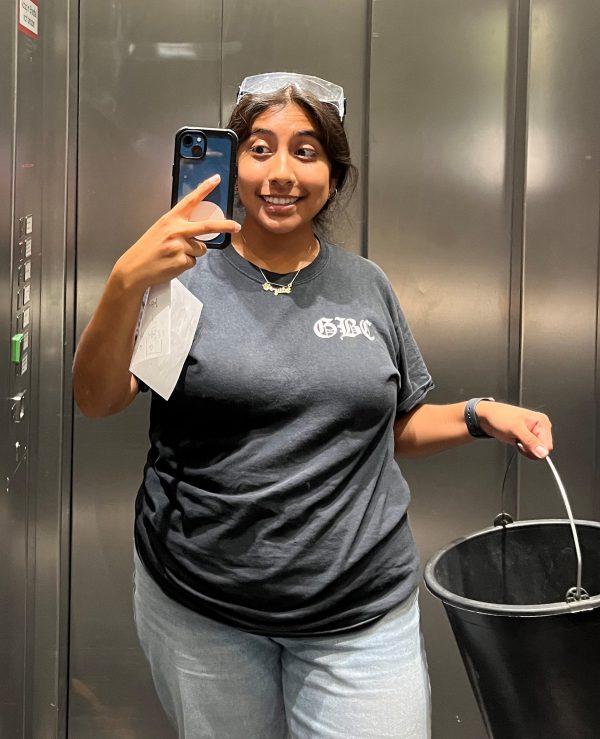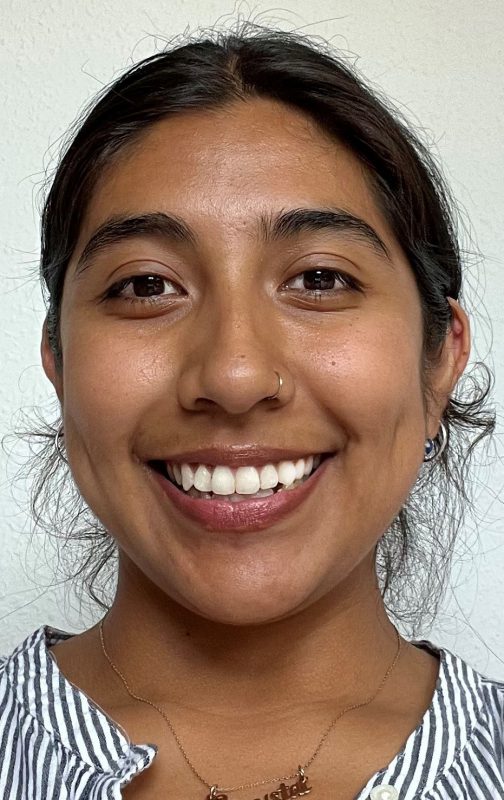


For the second year in a row, a Kalamazoo College chemistry student has been awarded the prestigious Priscilla Carney Jones Scholarship.
Crystal Mendoza ’23 is the 2022 recipient of the scholarship through the American Chemical Society. The scholarship provides a minimum of $1,500 funding toward tuition, books and lab fees for a female undergraduate student majoring in chemistry or a related discipline and beginning her junior or senior year.
Mendoza and the 2021 recipient of the scholarship, Ola Bartolik ’22, have both worked in the lab of Blakely Tresca, the Roger F. and Harriet G. Varney Assistant Professor in the Department of Chemistry and Biochemistry.
When Mendoza received the scholarship announcement, her reaction was, “Wow, oh my goodness, I actually got it,” she said, “because I really didn’t think I would get it. It was a little bit later than when they announced it the previous year, and in the back of my mind, I didn’t think they would give it back-to-back to someone from the same college.”
Once the news sank in, she called her mom to celebrate and sent Tresca a message.
“I was really surprised two students from the same school got the scholarship back-to-back, especially since they only award one each year,” Tresca said. “I’m not surprised, though, that Crystal earned it. She has worked really hard in research and at school, while at the same time doing so much for the department and the community at K helping mentor the next generation of chemists.”
The scholarship has both practical and intangible benefits for Mendoza. Not only does it cover Mendoza’s out-of-pocket costs for tuition, books and fees for her last year at K, it also provides a feeling of belonging.
“It was rewarding that the Women Chemists Committee posted the announcement on Twitter, Facebook, all their socials,” Mendoza said. “Seeing my face and the significance of the scholarship and what it means to the community of women chemists made me feel like I’m actually a part of this community. I feel like I can continue in the field of chemistry with support and inclusion.”


Finding her community and niche has been a journey for Mendoza. Arriving on campus in fall 2019, she intended to declare a biology major and follow the pre-med track. Her first term, however, she found herself not taking any biology courses and struggling through Chemistry 110. Her STEM journey could have ended there had it not been for Jeff Bartz, professor of chemistry and chair of the Department of Chemistry and Biochemistry.
Bartz invited Mendoza to come to his office hours and introduced her to Alex Cruz ’21, a chemistry major and fellow Los Angeles native. Cruz agreed to tutor Mendoza—the start of a mentoring relationship that continues to this day.


“She wanted to succeed,” Bartz said. “She was willing to ask for help and that’s sometimes the hardest thing for all of us to do, especially as a beginning college student among your peers where you want to look like you have it all together. I had enough of a relationship with her, because of the kind of place K is, to have a sense of what help she needed and who in our program could provide that help to her.”
Cruz introduced Mendoza to Sukuma Dow, a peer-led organization for underrepresented students in STEM, her first year at K. She has been an active participant ever since, serving last year and this coming year as a group leader.
“I did feel discouraged at some points my first year,” Mendoza said. “After taking some biology courses, I didn’t think STEM was for me. I doubted myself and it wasn’t until I got into the support group and talked more with Alex, Dr. Bartz and Dr. Tresca that I got myself out there and found what I truly enjoy. It has been a journey. I found what I like, I like being in a lab, and it took a lot of conversations, tough love and discipline to see that.”
Bartz, Cruz and Tresca all encouraged Mendoza to apply to Research Experiences for Undergraduates summer programs through the National Science Foundation. She ended up performing research on electrocatalysts for carbon dioxide reduction at the University of Southern California, where she scrapped any lingering thoughts of med school and committed wholeheartedly to a chemistry major and future goal of a doctorate in chemistry.
“I came back from that summer and immediately started looking for opportunities for this summer,” Mendoza said. She prioritized research abroad, as the COVID-19 shutdown had pushed her to delay courses she wanted to take in person until her junior year, taking study abroad off the table for her.
As a result, in mid-June, Mendoza arrived in Karlsruhe, Germany, to take part in a Research Internship in Science and Engineering (RISE) through the Deutscher Akademischer Austauschdienst (DAAD), or German Academic Exchange Service. RISE offers undergraduate students the opportunity to complete a summer internship at a top German research institution. Students are matched with a host university or institute according to their area of interest—Karlsruhe Institute for Technology for Mendoza—and DAAD provides students a monthly stipend to help cover living expenses.
German professor Kathryn Sederberg helped Mendoza arrange housing, and the DAAD funding is supplemented by the Nahrain Kamber and Ralph Griffith Endowed Student Research Fellowship benefiting female science students at K. Together, the two funding sources fully cover Mendoza’s living expenses and provide her with a small stipend as well.
Mendoza will remain in Karlsruhe until early September, conducting 12 weeks of research into photocatalysts for carbon dioxide reduction for her Senior Integrated Project.
“I’m learning even more than I thought, because I thought there would be some repetition from last summer, but it’s totally different,” Mendoza said. “I’m doing more synthesis, learning to read scientific literature for myself, and it’s more hands on.”
Catalysts are substances that increase the rate of a chemical reaction without undergoing any permanent chemical change. Electrocatalysts speed up electrochemical reactions, while photocatalysts absorb light to create energy that accelerates chemical reactions. Mendoza’s research involves attempts to artificially re-create photosynthesis, the process by which plants convert carbon dioxide into oxygen and carbohydrates.
“We take what’s happening in nature and try to find the optimal way to do it in solution in the lab,” Mendoza said. Currently, she is building three major components of the process—a photosensitizer, an electron donor and a catalyst—in different ways. Once she has built the library of different catalyst and photosensitizers, Mendoza will test the different components to see which perform the best for carbon dioxide reduction and turnover numbers.
At Karlsruhe, Mendoza has two Ph.D. student mentors, whom she describes as “helpful” and “very sweet” and who have given her independence to conduct her own project in the lab.
“At first, it was a little intimidating, but once I got the hang of it, it’s the best lab experience,” Mendoza said. “I’m just in awe at every reaction that I do, whether it’s successful or not, because I did it myself.”
Research into catalytic reduction of carbon dioxide could eventually have implications for reducing environmental pollution in the world, a topic of interest for Mendoza. Regardless, her time in Germany is proving enlightening.
“I had a really different perspective on what I thought the lab would be,” she said. “I thought it was going to be down to business, only doing experiments, let’s only talk about chemistry. My mentors have shown me otherwise. You can have fun, you can sing, you can dance, or you can enjoy a bottle of soda outside the lab.”
In addition to research and classes, Mendoza has worked as a chemistry teaching assistant.
“I really enjoy that,” she said. “It gives me more time in the lab and a chance to connect with people who want to do STEM and say, ‘Hey, you’re good at this, have you considered this major?’”
In 2021, K started a PRIME (Promoting Research, Inclusivity, Mentoring and Experience) Scholars program, funded by a National Science Foundation grant, and Bartz asked Mendoza to be a peer mentor for the 10 incoming first-year PRIME students.
“It’s been amazing seeing their progress from when they first came to campus and I met them during orientation,” Mendoza said. “It’s always rewarding after every meeting, one-on-one or in a group, to think that I was once in their place, not knowing what I wanted to do, and now being so accomplished in my discipline and helping them get there, too. I’m grateful that Dr. Bartz thought I was the right person for that.”
From mentee to mentor, doubt to confidence, Mendoza is thriving at K with guidance from strong mentors, support from peers, and opportunities for exploration and growth. With one year left at K, she’s looking ahead to her own future while extending a hand back to those coming behind her.
“We talk about certain students as having figured it out,” Bartz said. “What got them here is not what will get them through here. Early on, Crystal recognized that she didn’t have it figured out and was willing to ask for help. Now she’s one who figured it out and is willing to share that with others.”
